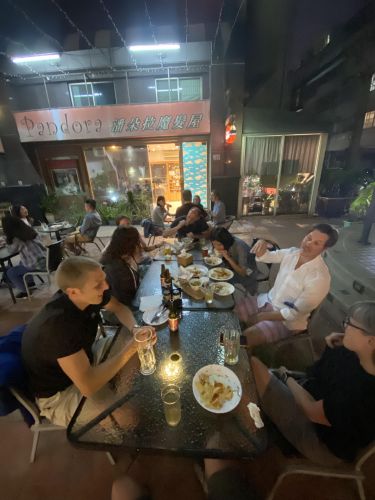A version of this article ran in the June issue of Bicycle Retailer & Industry News.
TAICHUNG CITY, Taiwan (BRAIN) — China's recent saber-rattling might have temporarily drowned out the buzz of freehubs in Taiwan, a country home to many manufacturers and U.S. industry expatriates, but it hasn't triggered alarms about impending conflict between the countries.
Of the 24 million people living in Taiwan, about 12,000 are Americans, and several of these expats in the industry contacted by BRAIN — like Mark Pippin — said daily life and routines haven't been affected.
"I think that most industry people that have been living and working in Taiwan have come to generally ignore the saber-rattling from Beijing," said Pippin, Essanty Taiwan bicycle division manager. "A lot of us remember being at the Taipei show in March 1996 when China was sending missiles over the island, so the latest talk is just that."
While tension has existed for decades between the two countries a mere 100 miles apart, it escalated after President Joe Biden took office in January. Taiwan, which for the past 25 years has been a democracy, reported repeated flyovers by Chinese warplanes. That led U.S. Admiral John Aquilino, chief of the Pentagon's Indo-Pacific command, to predict a Chinese invasion "is much closer to us than most think."
What war would mean to the industry
And if that happens, the industry — already struggling with a supply-chain drought because of the bike boom — would be crippled.
"If there was to be any action between Taiwan and China, it would surely stop business in its tracks," Pippin said. "The fallout against China would be the second punch to the industry. We, of course, use many materials that come from China here in Taiwan in both finished goods as well as unfinished items. At the same time, many factories and brands buy items directly from China to assemble bikes all over the rest of the world. The backlash would stop all those imports/exports from China. Ultimately, any action against Taiwan will cause almost a full stop to all bike production."
Jerry Huang, CEO of Smart Cycling in Taichung City, agreed.
"It will definitely shoot the bike supply chain down if a war occurs, no matter who starts it," said Huang, who added he's also concerned about tensions rising between China and the U.S.
Adrian Bleiler, KMC International's senior international sales manager based in Tainan City, said the ramifications of how a war could affect the industry hasn't been a hot topic among his colleagues, but "maybe contemplating the deeper ramifications of a full-blown war are beyond my pay grade."
An invasion is inevitable but not for some time, according to Wayne Moore, general manager of Legion in Changhua. "China will wait until it really believes it has the military might to take on the world," Moore said. "I believe by 2030, from a navy perspective, they will have achieved that goal. Today's activities are just test runs to see how the rest of the world will react."
According to Todd Latta, director of Essanty, the American opinion on the potential conflict falls into two categories.
"Regarding 'China,' and 'worry,' generally, there are two trains of thought here that I have exposure to. The expat that has their ears perked up and is involved in a certain amount of chatter about it, and the other (is) the local that believes it's saber-rattling and posturing and likely isn't even listening anymore. I generally fall into the second category, which may be a subject of my 30 years in both China and Taiwan. I'm not saying it's not possible China will invade, but the billions of Taiwan investments — both there and here — one million Taiwan residents there and the potential for international condemnation make it very complicated and difficult."
Bleiler was one of the few worried about an impending conflict.
"I've built a life here as a Canadian and I'm not looking to abandon Taiwan if/when things turn ugly," he said.
The head of a brand's Asia office in Taiwan who didn't want to be identified told BRAIN the recent escalation seems to worry people in the U.S. more than expats.
"We aren't stocking up on toilet paper in case of an invasion, or is that supposed to be for a typhoon? Maybe it's bread and milk for an invasion. I forget. But you get the point."
Drought was a more immediate concern
On the subject of rain — or in Taiwan's case, the lack thereof at the beginning of the year — the spring drought on the island affected industry folks on a personal level more than any potential military conflict. Normally one of the world's rainiest places, Taiwan was amid its worst drought in a half century with reservoirs at less than 20% capacity and some levels falling below 10% until recent rains eased water restrictions. Rationing resulted in water being turned off to businesses and residents a few days a week, with farmers the hardest hit.
Despite tensions simmering with China, the recent drought, and even a COVID-19 second wave that spiked cases in mid-May, it's business as usual in Taiwan as summer approaches. Latta warns that could all change quickly.
"For sure, the thought of war or even increased COVID infections, in addition to increased water issues, would have a major impact on the entire world's bike supply," Bleiler said. "Sometimes I think that the entire industry doesn't understand how fortunate it's been that Taiwan has been so diligent at mask-wearing and tracking cases of COVID. Had we been as poor at managing the situation as the U.S. or Canada, imagine the predicament every brand would be in."


